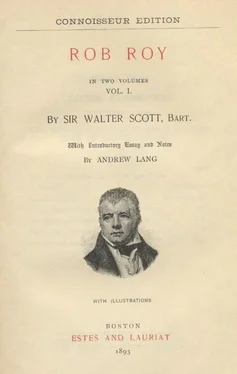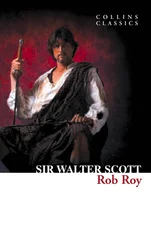Walter Scott - Rob Roy
Здесь есть возможность читать онлайн «Walter Scott - Rob Roy» — ознакомительный отрывок электронной книги совершенно бесплатно, а после прочтения отрывка купить полную версию. В некоторых случаях можно слушать аудио, скачать через торрент в формате fb2 и присутствует краткое содержание. Год выпуска: 2004, Жанр: Исторические приключения, на английском языке. Описание произведения, (предисловие) а так же отзывы посетителей доступны на портале библиотеки ЛибКат.
- Название:Rob Roy
- Автор:
- Жанр:
- Год:2004
- ISBN:нет данных
- Рейтинг книги:5 / 5. Голосов: 1
-
Избранное:Добавить в избранное
- Отзывы:
-
Ваша оценка:
- 100
- 1
- 2
- 3
- 4
- 5
Rob Roy: краткое содержание, описание и аннотация
Предлагаем к чтению аннотацию, описание, краткое содержание или предисловие (зависит от того, что написал сам автор книги «Rob Roy»). Если вы не нашли необходимую информацию о книге — напишите в комментариях, мы постараемся отыскать её.
Rob Roy — читать онлайн ознакомительный отрывок
Ниже представлен текст книги, разбитый по страницам. Система сохранения места последней прочитанной страницы, позволяет с удобством читать онлайн бесплатно книгу «Rob Roy», без необходимости каждый раз заново искать на чём Вы остановились. Поставьте закладку, и сможете в любой момент перейти на страницу, на которой закончили чтение.
Интервал:
Закладка:
MacGregor's brother was one of the very few of the tribe who was slain. He was buried near the field of battle, and the place is marked by a rude stone, called the Grey Stone of MacGregor.
Sir Humphrey Colquhoun, being well mounted, escaped for the time to the castle of Banochar, or Benechra. It proved no sure defence, however, for he was shortly after murdered in a vault of the castle,—-the family annals say by the MacGregors, though other accounts charge the deed upon the MacFarlanes.
This battle of Glenfruin, and the severity which the victors exercised in the pursuit, was reported to King James VI. in a manner the most unfavourable to the clan Gregor, whose general character, being that of lawless though brave men, could not much avail them in such a case. That James might fully understand the extent of the slaughter, the widows of the slain, to the number of eleven score, in deep mourning, riding upon white palfreys, and each bearing her husband's bloody shirt on a spear, appeared at Stirling, in presence of a monarch peculiarly accessible to such sights of fear and sorrow, to demand vengeance for the death of their husbands, upon those by whom they had been made desolate.
The remedy resorted to was at least as severe as the cruelties which it was designed to punish. By an Act of the Privy Council, dated 3d April 1603, the name of MacGregor was expressly abolished, and those who had hitherto borne it were commanded to change it for other surnames, the pain of death being denounced against those who should call themselves Gregor or MacGregor, the names of their fathers. Under the same penalty, all who had been at the conflict of Glenfruin, or accessory to other marauding parties charged in the act, were prohibited from carrying weapons, except a pointless knife to eat their victuals. By a subsequent act of Council, 24th June 1613, death was denounced against any persons of the tribe formerly called MacGregor, who should presume to assemble in greater numbers than four. Again, by an Act of Parliament, 1617, chap. 26, these laws were continued, and extended to the rising generation, in respect that great numbers of the children of those against whom the acts of Privy Council had been directed, were stated to be then approaching to maturity, who, if permitted to resume the name of their parents, would render the clan as strong as it was before.
The execution of those severe acts was chiefly intrusted in the west to the Earl of Argyle and the powerful clan of Campbell, and to the Earl of Athole and his followers in the more eastern Highlands of Perthshire. The MacGregors failed not to resist with the most determined courage; and many a valley in the West and North Highlands retains memory of the severe conflicts, in which the proscribed clan sometimes obtained transient advantages, and always sold their lives dearly. At length the pride of Allaster MacGregor, the chief of the clan, was so much lowered by the sufferings of his people, that he resolved to surrender himself to the Earl of Argyle, with his principal followers, on condition that they should be sent out of Scotland. If the unfortunate chief's own account be true, he had more reasons than one for expecting some favour from the Earl, who had in secret advised and encouraged him to many of the desperate actions for which he was now called to so severe a reckoning. But Argyle, as old Birrell expresses himself, kept a Highlandman's promise with them, fulfilling it to the ear, and breaking it to the sense. MacGregor was sent under a strong guard to the frontier of England, and being thus, in the literal sense, sent out of Scotland, Argyle was judged to have kept faith with him, though the same party which took him there brought him back to Edinburgh in custody.
MacGregor of Glenstrae was tried before the Court of Justiciary, 20th January 1604, and found guilty. He appears to have been instantly conveyed from the bar to the gallows; for Birrell, of the same date, reports that he was hanged at the Cross, and, for distinction sake, was suspended higher by his own height than two of his kindred and friends.
On the 18th of February following, more men of the MacGregors were executed, after a long imprisonment, and several others in the beginning of March.
The Earl of Argyle's service, in conducting to the surrender of the insolent and wicked race and name of MacGregor, notorious common malefactors, and in the in-bringing of MacGregor, with a great many of the leading men of the clan, worthily executed to death for their offences, is thankfully acknowledged by an Act of Parliament, 1607, chap. 16, and rewarded with a grant of twenty chalders of victual out of the lands of Kintire.
The MacGregors, notwithstanding the letters of fire and sword, and orders for military execution repeatedly directed against them by the Scottish legislature, who apparently lost all the calmness of conscious dignity and security, and could not even name the outlawed clan without vituperation, showed no inclination to be blotted out of the roll of clanship. They submitted to the law, indeed, so far as to take the names of the neighbouring families amongst whom they happened to live, nominally becoming, as the case might render it most convenient, Drummonds, Campbells, Grahams, Buchanans, Stewarts, and the like; but to all intents and purposes of combination and mutual attachment, they remained the clan Gregor, united together for right or wrong, and menacing with the general vengeance of their race, all who committed aggressions against any individual of their number.
They continued to take and give offence with as little hesitation as before the legislative dispersion which had been attempted, as appears from the preamble to statute 1633, chapter 30, setting forth, that the clan Gregor, which had been suppressed and reduced to quietness by the great care of the late King James of eternal memory, had nevertheless broken out again, in the counties of Perth, Stirling, Clackmannan, Monteith, Lennox, Angus, and Mearns; for which reason the statute re-establishes the disabilities attached to the clan, and, grants a new commission for enforcing the laws against that wicked and rebellious race.
Notwithstanding the extreme severities of King James I. and Charles I. against this unfortunate people, who were rendered furious by proscription, and then punished for yielding to the passions which had been wilfully irritated, the MacGregors to a man attached themselves during the civil war to the cause of the latter monarch. Their bards have ascribed this to the native respect of the MacGregors for the crown of Scotland, which their ancestors once wore, and have appealed to their armorial bearings, which display a pine-tree crossed saltire wise with a naked sword, the point of which supports a royal crown. But, without denying that such motives may have had their weight, we are disposed to think, that a war which opened the low country to the raids of the clan Gregor would have more charms for them than any inducement to espouse the cause of the Covenanters, which would have brought them into contact with Highlanders as fierce as themselves, and having as little to lose. Patrick MacGregor, their leader, was the son of a distinguished chief, named Duncan Abbarach, to whom Montrose wrote letters as to his trusty and special friend, expressing his reliance on his devoted loyalty, with an assurance, that when once his Majesty's affairs were placed upon a permanent footing, the grievances of the clan MacGregor should be redressed.
At a subsequent period of these melancholy times, we find the clan Gregor claiming the immunities of other tribes, when summoned by the Scottish Parliament to resist the invasion of the Commonwealth's army, in 1651. On the last day of March in that year, a supplication to the King and Parliament, from Calum MacCondachie Vich Euen, and Euen MacCondachie Euen, in their own name, and that of the whole name of MacGregor, set forth, that while, in obedience to the orders of Parliament, enjoining all clans to come out in the present service under their chieftains, for the defence of religion, king, and kingdoms, the petitioners were drawing their men to guard the passes at the head of the river Forth, they were interfered with by the Earl of Athole and the Laird of Buchanan, who had required the attendance of many of the clan Gregor upon their arrays. This interference was, doubtless, owing to the change of name, which seems to have given rise to the claim of the Earl of Athole and the Laird of Buchanan to muster the MacGregors under their banners, as Murrays or Buchanans. It does not appear that the petition of the MacGregors, to be permitted to come out in a body, as other clans, received any answer. But upon the Restoration, King Charles, in the first Scottish Parliament of his reign (statute 1661, chap. 195), annulled the various acts against the clan Gregor, and restored them to the full use of their family name, and the other privileges of liege subjects, setting forth, as a reason for this lenity, that those who were formerly designed MacGregors had, during the late troubles, conducted themselves with such loyalty and affection to his Majesty, as might justly wipe off all memory of former miscarriages, and take away all marks of reproach for the same.
Читать дальшеИнтервал:
Закладка:
Похожие книги на «Rob Roy»
Представляем Вашему вниманию похожие книги на «Rob Roy» списком для выбора. Мы отобрали схожую по названию и смыслу литературу в надежде предоставить читателям больше вариантов отыскать новые, интересные, ещё непрочитанные произведения.
Обсуждение, отзывы о книге «Rob Roy» и просто собственные мнения читателей. Оставьте ваши комментарии, напишите, что Вы думаете о произведении, его смысле или главных героях. Укажите что конкретно понравилось, а что нет, и почему Вы так считаете.









